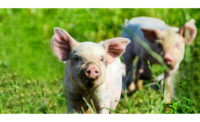Role of Weighing in Livestock Agricultural Applications

Scales are crucial to produce and livestock agricultural businesses. Invest in a scale that is accurate and repeatable, sensitive, reliable and easily serviced. Avoid needless costs from repair and downtime by selecting a scale that can stand up to the conditions it will face.
Livestock weighing vs. produce weighing
Scales are used for a wide variety of produce and livestock agricultural weighing applications. For crop production, scales are used in formulation of fertilizers, insecticides, herbicides and hybrid seed production.
Livestock applications include formulation of feed and check-weighing animals for rate of gain on different types of feed. Mono-rail scales are used in packing plants for checking yield and shrinkage and weighing final product primal cuts.
Tracking products and weighing operations
More and more weighing operations are tracking products through the food chain. Users want to know whether crops were genetically modified, treated with any herbicides or insecticides and stored properly to prevent damage. Livestock applications are tracking the animal from birth to slaughter and determining whether the animal crossed borders or came from a disease-prone area.
Another trend is increasing use of higher resolutions than the National Type Evaluation Program (NTEP), which allows 10,000 divisions. In response to the desire for tighter inventory control of expensive ingredients added to inexpensive bulk commodities, users are looking for 20 up to 50,000 divisions.
Factors to consider
Accuracy, repeatability, sensitivity, reliability and serviceability are key things to look for in a scale. Most users in the produce/livestock agriculture environment deal with a very small profit margin on huge quantities so they require reliable, accurate weights without having to expend time and money on maintenance and upkeep. If a scale is broken or condemned by the state, they have to make arrangements to use another scale and replace the inaccurate one, resulting in additional costs.
An inferior scale often fails during heavy usage — just when it is needed most. Users may have to conduct costly emergency repairs — using overtime labor and airfreight rush for parts — so they can quickly get the scale back up and running. Because the failing scale is then replaced in the off-season, all the money spent on repairs is wasted.
Considering a scale as just a commodity, many buy one made as cheaply as possible. The inexpensive scale initially performs adequately, but the platform weakens with every weighing until it suffers from metal fatigue and has to be replaced. Another mistake is choosing a pit scale built with very little rebar, which will fail quickly because of low strength.
An investment in the business
Scales play a major role in produce and livestock agricultural settings. With the very real cost of repair labor, inflation and downtime, a wise customer should buy the very best scale made, regardless of price. In the long term, a small price difference is negligible. NP
Looking for a reprint of this article?
From high-res PDFs to custom plaques, order your copy today!







